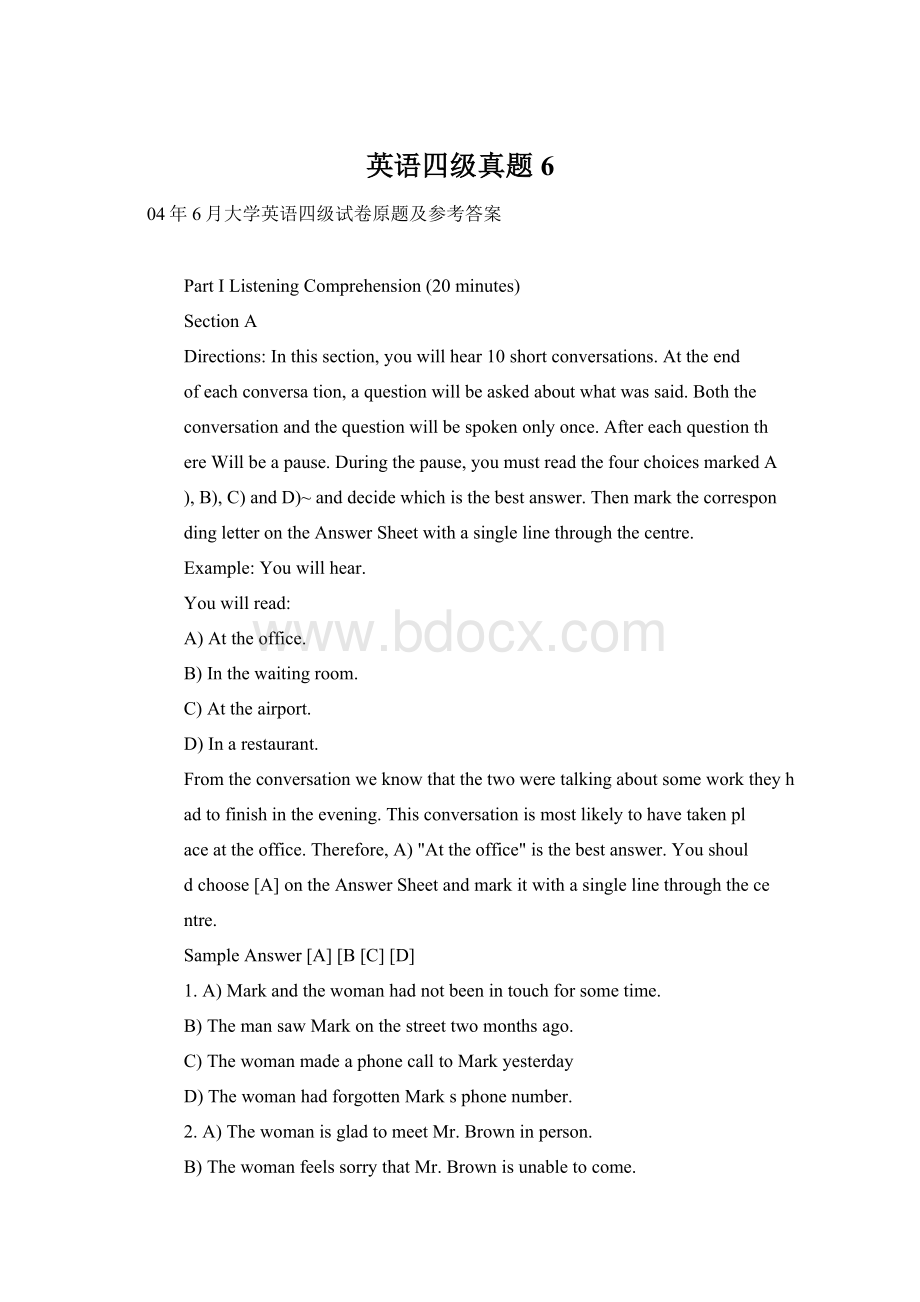英语四级真题6.docx
《英语四级真题6.docx》由会员分享,可在线阅读,更多相关《英语四级真题6.docx(14页珍藏版)》请在冰豆网上搜索。

英语四级真题6
04年6月大学英语四级试卷原题及参考答案
PartIListeningComprehension(20minutes)
SectionA
Directions:
Inthissection,youwillhear10shortconversations.Attheend
ofeachconversation,aquestionwillbeaskedaboutwhatwassaid.Boththe
conversationandthequestionwillbespokenonlyonce.Aftereachquestionth
ereWillbeapause.Duringthepause,youmustreadthefourchoicesmarkedA
),B),C)andD)~anddecidewhichisthebestanswer.Thenmarkthecorrespon
dingletterontheAnswerSheetwithasinglelinethroughthecentre.
Example:
Youwillhear.
Youwillread:
A)Attheoffice.
B)Inthewaitingroom.
C)Attheairport.
D)Inarestaurant.
Fromtheconversationweknowthatthetwoweretalkingaboutsomeworktheyh
adtofinishintheevening.Thisconversationismostlikelytohavetakenpl
aceattheoffice.Therefore,A)"Attheoffice"isthebestanswer.Youshoul
dchoose[A]ontheAnswerSheetandmarkitwithasinglelinethroughthece
ntre.
SampleAnswer[A][B[C][D]
1.A)Markandthewomanhadnotbeenintouchforsometime.
B)ThemansawMarkonthestreettwomonthsago.
C)ThewomanmadeaphonecalltoMarkyesterday
D)ThewomanhadforgottenMarksphonenumber.
2.A)ThewomanisgladtomeetMr.Browninperson.
B)ThewomanfeelssorrythatMr.Brownisunabletocome.
C)ThemanismeetingthewomanonbehalfofMr.Brown.
D)Themanislateforthetripbecauseheisbusy.
3.A)At10:
25.C)At10:
45.
B)At10:
30.D)At10:
40.
4.A)Themanrefusestolistentohisdoctorsadvice.
B)Themanisunderpressurefromhiswife.
C)Themanusuallyfollowshiswifesadvice.
D)Themannolongersmokes.
5.A)Becomeateacher.C)Movetoabigcity.
B)Gobacktoschool.D)WorkinNewYork.
6.A)Quitdeliveringflowers.C)Workatarestaurant.
B)Leavehisjobtoworkforher.D)Bringherflowerseveryday.
7.A)Shecanfindtherightpersontohelptheman.
B)Shepickedupthebookfromthebusfloor.
C)Shecanhelpthemanout.
D)Shesalsoinneedofatextbook.
8.A)Themancantcomefortheappointmentat4:
15.
B)Themanisgladhesgotintouchwiththedoctor.
C)Themanwantstochangethedateoftheappointment.
D)Themanwasconfusedaboutthedateoftheappointment.
9.A)Themaniswordedabouthisfuture.
B)Thetwospeakersareseniorsatcollege.
C)Thetwospeakersareatalosswhattodo.
D)Thewomanregretsspendinghertimeidly.
10.A)Sheals0foundtheplotdifficulttofollow.
B)Shehaslearnedalotfromthenovel:
C)Sheusuallyhasdifficultyrememberingnames.
PartIIReadingComprehension(35minutes)
Directions:
Thereare4passagesinthispart.Eachpassageisfollowedbysomequestionsorunfinishedstatements.ForeachofthemtherearefourchoicesmarkedA),B),C)andD).YoushoulddecideonthebestchoiceandmarkthecorrespondingletterontheAnswerSheetwithasinglelinethroughthecentre.
PassageOne
Questions11to15arebasedonthefollowingpassage.
Signhasbecomeascientifichotbutton.Onlyinthepast20yearshavespecialistsinlanguagestudyrealizedthatsignedlanguagesareunique-aspeechofthehand.Theyofferanewwaytoprobehowthebraingeneratesandunderstandslanguage,andthrownewlightonanoldscientificcontroversy:
whetherlanguage,completewithgrammar,issomethingthatwearebornwith,orwhetheritisalearnedbehavior.Thecurrentinterestinsignlanguagehasrootsinthepioneering
workofonerebelteacheratGallaudetUniversityinWashington,D.C.,theworldsonlyliberalartsuniversityfordeafpeople.
WhenBillStokoewenttoGallaudettoteachEnglish,theschoolenrolledhiminacourseinsigning.ButStokoenoticedsomethingodd:
amongthemselves,studentssigneddifferentlyfromhisclassroomteacher.
Stokoehadbeentaughtasortofgesturalcode,eachmovementofthehandsrepresentingawordinEnglish.Atthetime,AmericanSignLanguage(ASL)wasthoughttobenomorethanaformofpidginEnglish(混杂英语).ButStokoebelievedthe"handtalk"hisstudentsusedlookedricher.Hewondered:
Mightdeafpeopleactuallyhaveagenuinelanguage?
Andcouldthatlan-
guagebeunlikeanyotheronEarth?
Itwas1955,whenevendeafpeopiedismissedtheirsigningas"substandard".Stokoesideawasacademicheresy(异端邪说).
Itis37yearslater.Stokoe-nowdevotinghistimetowritingandeditingbooksandjournalsandtoproducingvideomaterialsonASLandthedeafculture-ishavinglunchatacaf6neartheGallaudetcampusandexplaininghowhestartedarevolution.FordecadeseducatorsfoughthisideathatsignedlanguagesarenaturallanguageslikeEnglish,FrenchandJapanese.Theyassumed
languagemustbebasedonspeech,themodulation(调节)ofsound.Butsignlanguageisbasedonthemovementofhands,themodulationofspace."WhatIsaid,"Stokoeexplains,"isthatlanguageisnotmouthstuff-itsbrainstuff."
11.Thestudyofsignlanguageisthoughttobe
A)anapproachtosimplifyingthegrammaticalstructureofalanguage
B)anattempttoclarifymisunderstandingabouttheoriginoflanguage
C)achallengetotraditionalviewsonthenatureoflanguage
D)anewwaytotookatthelearningoflanguage[C]
12.Thepresentgrowinginterestinsignlanguagewasstimulatedby
A)aleadingspecialistinthestudyOfliberalarts
B)anEnglishteacerinauniversityforthedeaf
"C)SomeseniorexpertsinAmericanSignLanguage
D)afamousScholarinthestudyofthehumanbrain
13.AccordingtoStokoe,signlanguageis
A)aninternationallanguageC)anartificiallanguage
B)asubstandardlanguageD)agenuinelanguage[D]
14.MosteducatorsobjectedtoStokoesideabecausetheythought
A)alanguageshouldbeeasytouseandunderstand
B)signlanguagewastOOartificialtobewidelyaccepted
C)alanguagecouldonlyexistintheformofspeechsounds
D)signlanguagewasnotextensivelyusedevenbydeafpeople[C]
15.Stokoesargumentisbasedonhisbeliefthat
A)languageisaproductofthebrain
B)languageisasystemofmeaningfulcodes
C)signlanguageisderivedfromnaturallanguage
D)signlanguageisasefficientasanyotherlanguage[A]
PassageTwo
Questions16to20arebasedonthefollowingpassage.
Aisforalwaysgettingtoworkontime.
Bisforbeingextremelybusy.
Cisfortheconscientious(勤勤恳恳的)wayyoudoyourjob.
Youmaybeallthesethingsattheoffice,andmore.Butwhenitcomestogettingahead,expertsSay,theABcsofbusinessshouldincludeaP,forpolitics,asinofficepolitics.
DaleCarnegiesuggestedasmuchmorethan50yearsagHardworkalonedoesntensureCareeradvancemen.Youhavetobeabletosellyourselfandyourideas,bothpubliclyandbehindthescefies.Yet,despitetheoviousrewardsOfengaginginofficepolitics-abetterjob,araise,praise-manypeoplearestillunableorunwilling-to"playthegame."
"Peopleassumethatofficepoliticsinvolvessomemanipulative(工于心计的)behavior,"saysDeborahComer,anassistantprofessorofmanagementatHofstraUniversity."Butpoliticsderivesfromthewordpolite.Itcanmeanlobbyingandformingassociations.Itcanmeanbeingkindandhelpful,oreventrying,topleaseyoursuperior,andthenexpectingsomethinginreturn."
Infact,today,expertsdefineofficepoliticsasproperbehaviorusedtopursueonesownself-interestintheworkplace.Inmanycases,thisinvolvessomeformofsocializingwithintheofficeenvironment-notjustinlargecompanies,butinsmallworkplacesaswell.
"Thefirstthingpeopleareusuallyjudgedonistheirabilitytoperformwellonaconsistentbasis,"saysNeilP.Lewis,amanagementpsychologist."Butiftwoorthreecandidatesareupforapromotion,eachofwhomhasreasonablysimilarability,amanagerisgoingtopromotethepersonheorshelikesbest.Itssimplehumannature."
Yet,psychologistssay,manyemployeesandemployershavetroublewiththeconceptofpoliticsintheoffice.Somepeople,theysay,haveanidealisticvisionofworkandwhatittakestosucceed.Stillothersassociatepoliticswithfiattery奉承),fearfulthat,iftheyspeakupforthemselves,theymayappeartobeflatteringtheirbossforfavors.
Expertssuggestalteringthisnegativepicturebyrecognizingtheneedforsomeself-promotion.
16."Officepolitics"(Line2,Para.4)isusedinthepassagetoreferto
A)thepoliticalviewsandbeliefsofofficeworkers
B)theinterpersonalrelationshipswithinacompany
C)thevariousqualitiesrequiredforasuccessfulcareer
D)thecodeofbehaviorforcompanystaff
17.Togetpromoted,onemustnotonlybecompetentbut
A)avoidbeingtoooutstanding
B)getalongwellwithhiscolleagues
C)honestandloyaltohiscompany
D)givehisbossagoodimpression[D]
18.Whyaremanypeopleunwillingto"playthegame"(Line4,Para.5)?
A)Theyarenotgoodatmanipulatingcolleagues.
B)Theyfeelthatsuchbehaviorisunprincipled.
C)Theythinktheeffortwillgetthemnowhere.
D)Theybelievethatdoingsoisimpractical.
19.Theauthorconsidersofficepoeticstobe.
A)unwelcomeattheworkplace
B)badforinterpersonalrelationships
C)animportantfactorforpersonaladvancement
D)indispensabletothedevelopmentofcompanyculture[C]
20.Itistheauthorsviewthat
A)self-promotiondoesnotnecessarilymeanflattery
B)hardworkcontributesVerylittletoonespromotion
C)manyemployeesfailtorecognizetheneedofflattery
D)speakingupforoneselfispartofhumannature[A]
PassageThree